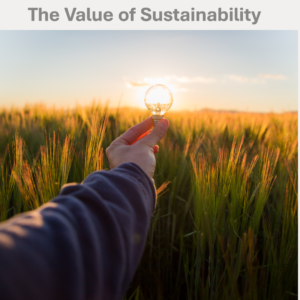In the face of unprecedented environmental challenges, the concept of sustainability has emerged as a guiding principle for individuals, communities, and businesses alike. Sustainability, at its core, represents the ability to meet the needs of the present without compromising the ability of future generations to meet their own needs. It goes beyond the realm of environmental protection to encompass economic prosperity, social equity, and ethical responsibility. As we stand at a critical juncture in history, grappling with the consequences of past actions, the value of sustainability has never been more apparent. This blog post delves into the sustainability challenges facing our societies, the essence of sustainable development, and a strategic approach for businesses to embrace sustainability as a core value.

The Sustainability Challenge: Recognizing Our Impact
In recent decades, the human impact on the planet has escalated to alarming levels. Climate change, loss of biodiversity, resource depletion, and pollution are just some of the symptoms of an unsustainable lifestyle. The earth’s natural systems are under severe strain, and the consequences of neglecting this reality are profound and far-reaching.
Sustainable development, as first introduced by the Brundtland Commission in 1987, seeks to address this challenge by advocating for an inclusive, equitable, and forward-looking approach to development. It emphasizes the interconnectedness of social, environmental, and economic factors and seeks to strike a balance that allows progress without compromising the planet’s integrity.
Embracing Sustainability: A Staged and Strategic Approach for Businesses
As the driving force behind much of the world’s economic activity, businesses play a pivotal role in shaping our sustainable future. Transitioning towards sustainability requires a staged and strategic approach:
1. Assessment and Vision: Businesses must start by assessing their current practices and their impact on the environment and society. This process involves setting a sustainability vision and identifying long-term goals that align with the principles of sustainable development.
2. Integrating Sustainability: Sustainability should not be treated as a separate department or a superficial marketing strategy. It must be integrated into the core values and operations of the company. This involves fostering a culture of sustainability, where employees are engaged and committed to making a positive impact.
3. Innovation and Efficiency: Embracing sustainability often necessitates innovative thinking. Companies must continuously explore ways to reduce their environmental footprint, optimize resource use, and adopt cleaner technologies. This can not only lead to cost savings but also unlock new opportunities for growth and market leadership.
4. Supply Chain and Partnerships: Businesses must collaborate with suppliers, partners, and stakeholders to ensure sustainability is ingrained throughout the value chain. By holding suppliers accountable for sustainable practices, companies can amplify their impact and drive positive change beyond their immediate sphere of influence.
5. Transparency and Reporting: Transparent reporting on sustainability initiatives is vital for fostering trust among consumers and stakeholders. Companies should be accountable for their actions and demonstrate progress toward their sustainability goals.
New Thinking: Business, Development, and Economic Reorganizing
Achieving sustainability necessitates a paradigm shift in the way we think about business, development, and economic growth:
1. Regenerative Economies: Moving beyond the traditional linear economic model (take, make, dispose of), we must strive for regenerative economies that emphasize recycling, upcycling, and responsible consumption. This transition can open up new economic opportunities while minimizing waste and environmental harm.
2. Social Responsibility: Businesses are increasingly expected to be socially responsible. This involves fair treatment of employees, supporting local communities, and ensuring ethical practices throughout the supply chain.
3. Beyond Profit: While profit is essential for any business, it should not come at the expense of the environment or society. Companies can redefine success by considering the triple bottom line—people, planet, and profit.
4. Inclusive Growth: Sustainable development aims to leave no one behind. Businesses should focus on creating inclusive growth, providing equal opportunities, and contributing to the well-being of all stakeholders.
In conclusion, the value of sustainability cannot be overstated. It is not just a buzzword or a passing trend but rather a fundamental necessity for our survival and prosperity. Embracing sustainability requires a proactive and strategic approach from businesses, redefining the way we perceive growth and success. By taking responsibility for their impact on the planet and society, businesses can be a driving force for positive change, helping pave the way towards a better and more sustainable future for all.
I’ve been absent for some time, but now I remember why I used to love this site. Thanks , I will try and check back more frequently. How frequently you update your website?
Thank you Ombre. I used to update frequently , i took a break for few weeks back again now.
It抯 really a great and useful piece of information. I抦 satisfied that you shared this helpful info with us. Please stay us informed like this. Thank you for sharing.
Thank you. Much appreciated.
Thank you for writing this post. I like the subject too.
Glad you liked it.
You’re so innovative!